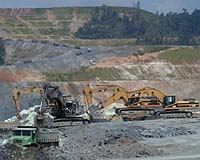| . |  |
. |
Halifax, Canada (AFP) Nov 21, 2009 A war will likely never be fought over the Arctic, Canada's top soldier said Saturday, but its opening up could spark new clashes as far away as the Middle East and between trading nations. "There is no conventional military threat to the Arctic," General Walter Natynczyk, told a defense summit here. "If someone were to invade the Canadian Arctic, my first task would be to rescue them." "The Arctic is a very harsh environment," he explained. "This is not an easy environment of the world to operate in." Canada's chief of defense staff was echoed by US General Victor Renuart, commander of the North American Aerospace Defense Command (NORAD), and Espen Barth Eide, Norway's secretary of state for defense. All three members of a panel discussion at the Halifax International Security Forum downplayed recent increased Russian military flights and sailings in the north. "We should follow it seriously, but we should not be alarmed by it," said Eide. Of more pressing concern, said fourth panelist Stephen Carmel of Maersk Line, is the huge impact the creation of new Arctic shipping routes will have on global trade. Such "will be felt far from the Arctic," said Carmel. "It's not the Arctic that really is the issue, it is everything else." Most Europe-Asia trade now travels through the Suez Canal. Diverting this traffic through the famed Northwest Passage, which is predicted to become ice-free as early as 2050 due to warming, would cut travel distance by 40 percent. However, any large-scale diversion of traffic would also cut tolls that now represent Egypt's second-largest source of foreign currency earnings. "If you take that away," said Carmel, "it becomes a stability issue for Egypt and it becomes a stability issue for the Middle East as a whole." "There are also implications for relative costs between major trading partners," he warned. For example, a viable northern shipping route could make Chinese agricultural products relatively cheaper in the United States, displacing local produce from groceries. "Obviously (US) West Coast farmers are not going to deal well with that and there will be a reaction," said Carmel. "And that sort of thing will multiply through hundreds and hundreds of products and the result will be trade friction in anything that dramatically changes relative costs." "That is the sort of thing that leads to conflict," Carmel concluded. "These sort of trade effects are what will really change the world, not whether we get a few more barrels of oil from the Arctic." Five countries bordering the Arctic -- Canada, Denmark, Norway, Russia and the United States -- claim overlapping parts of the region estimated to hold 90 billion untapped barrels of oil. Moscow believes it should also control the Northern Sea Route, a passage that stretches from Asia to Europe across northern Russia, and in 2007 planted a flag on the ocean floor beneath the North Pole in a symbolic staking of its claim over the region. Canada meanwhile has claimed the Northwest Passage, but is at odds with the United States which considers it to be international waters. Last year, Canada announced it was stepping up its military alertness along its northern frontier in response to Russian "testing" of its boundaries with military flights skirting the border which had not been seen since the Cold War. Ottawa responded with plans for a sensor net, more navy patrols and a military training camp in the far north. More recently, Russia surprised the United States when it launched an intercontinental missile from a submarine in the Arctic Ocean. And in September, the USS Texas submarine surfaced at the North Pole on its maiden voyage, showcasing Arctic travel capabilities the Virginia-class submarine was not previously known to possess. "There is always a potential for conflict," Eide said, "but there are more reasons to believe that if we play our cards well, both on the Russian side and our side, we will be able to work together" in the Arctic. Share This Article With Planet Earth
Related Links Global Trade News
 China blocks WTO panel request on raw materials curbs
China blocks WTO panel request on raw materials curbsBeijing (AFP) Nov 20, 2009 China said Friday it had exercised its right to block a US-led request for the World Trade Organization (WTO) to set up a panel to rule on Chinese export curbs on certain raw materials. "We do not think the export measures China took violated WTO rules," an official with the Chinese commerce ministry, who declined to be named, told AFP. "It was a legitimate right (to reject the requests ... read more |
|
| The content herein, unless otherwise known to be public domain, are Copyright 1995-2009 - SpaceDaily. AFP and UPI Wire Stories are copyright Agence France-Presse and United Press International. ESA Portal Reports are copyright European Space Agency. All NASA sourced material is public domain. Additional copyrights may apply in whole or part to other bona fide parties. Advertising does not imply endorsement,agreement or approval of any opinions, statements or information provided by SpaceDaily on any Web page published or hosted by SpaceDaily. Privacy Statement |